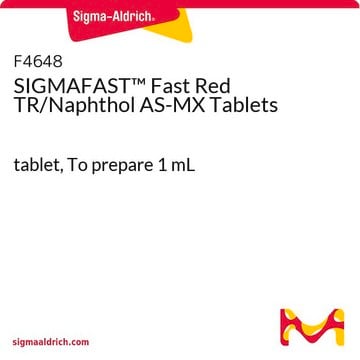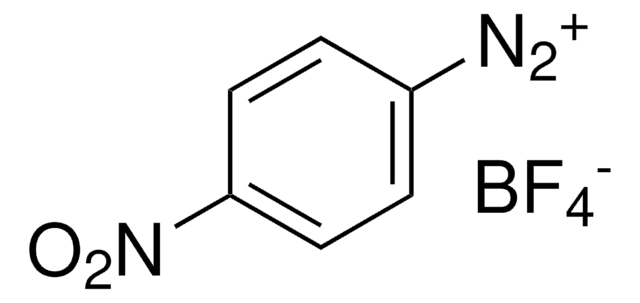368881
Fast Red TR Salt
Dye content 15 %
Synonym(s):
Fast Red TR Salt hemi(zinc chloride) salt, 4-Chloro-2-methylbenzenediazonium salt, Azoic Diazo No. 11
About This Item
Recommended Products
form
powder
composition
Dye content, 15%
λmax
284 nm
ε (extinction coefficient)
≥3000 at 281-287 nm in water at 0.006 g/L
application(s)
diagnostic assay manufacturing
hematology
histology
storage temp.
room temp
SMILES string
[Cl-].[Cl-].Cl[Zn]Cl.Cc1cc(Cl)ccc1[N+]#N.Cc2cc(Cl)ccc2[N+]#N
InChI
1S/2C7H6ClN2.4ClH.Zn/c2*1-5-4-6(8)2-3-7(5)10-9;;;;;/h2*2-4H,1H3;4*1H;/q2*+1;;;;;+2/p-4
InChI key
RIIVFDKBXXMYRL-UHFFFAOYSA-J
Looking for similar products? Visit Product Comparison Guide
Related Categories
General description
Application
Signal Word
Danger
Hazard Statements
Precautionary Statements
Hazard Classifications
Aquatic Chronic 2 - Eye Dam. 1 - Skin Corr. 1C
Storage Class Code
8A - Combustible corrosive hazardous materials
WGK
WGK 3
Flash Point(F)
Not applicable
Flash Point(C)
Not applicable
Certificates of Analysis (COA)
Search for Certificates of Analysis (COA) by entering the products Lot/Batch Number. Lot and Batch Numbers can be found on a product’s label following the words ‘Lot’ or ‘Batch’.
Already Own This Product?
Find documentation for the products that you have recently purchased in the Document Library.
Customers Also Viewed
Our team of scientists has experience in all areas of research including Life Science, Material Science, Chemical Synthesis, Chromatography, Analytical and many others.
Contact Technical Service













